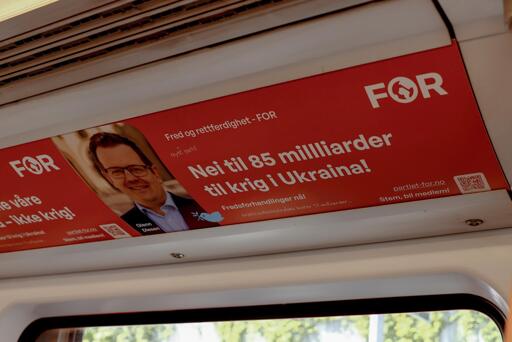Because this is a developing situation and the article keeps changing and I’ve already translated two articles about Peace & Justice today, I didn’t feel like translating this Aftenposten article in full… Though I guess my summary of the article is arguably complete enough that it counts as a translation “of sorts”…? I dunno.
The gist of it is that the Peace & Justice Party’s posters on the Oslo Metro, which say that the money Norway spends on Ukraine should instead be spent on welfare, keep getting vandalized, and the party has thus decided to end its contract. The official statement from the party, via party leader Marielle Leraand’s Facebook account:
Press statement from Peace & Justice (FOR): End of advertising contract in Oslo’s public transit network
Oslo, May 19th, 2025
The Peace & Justice Party has resolved to terminate the contract for advertising posters in Oslo’s public transit. The cause is that Sporveien [who operate the Oslo Metro] has not been able to uphold the contract due to systematic, politically-motivated vandalism of our posters. The vandalism comes from actors who support NATO’s proxy war in Ukraine, and reveals a disturbing intolerance for freedom of speech and democratic debate.
Historically, the foundational idea of fascism was a blind support for national participation in war, where resistance to democracy was justified with the desire for political unity in war time. The aggressive response to our pacifist campaign shows how easily offended and nervously aggressive the cross-party consensus on war financing is. Our posters, which challenge Norway’s role in the conflict, have clearly struck a nerve, and the vandalism shows a democratic deficit when people try to silence critical voices.
The Peace & Justice Party will now spend the resources we are saving on the advertising contract on furthering our pacifist message in other arenas. This will be a test of the strength of Norwegian democracy: Will we be able to express ourselves freely, or will the attempts to silence us continue? We would like everybody who values freedom of speech and open debate about Norwegian foreign policy to support our work.
JC Decaux Norway, who are responsible for the ads on the Oslo Metro, do not believe that the vandalism campaign constitutes a breach of contract on Sporveien’s part. CEO Gisle Holst Roness explains that the contract would have JC Decaux install new posters, but Peace & Justice would have to pay for the replacements; the party apparently paid for half of the posters in advance, and by canceling now they won’t have to pay the other half. Roness does not wish to comment on whether the party’s cancellation of the campaign may be connected to the mounting costs of having to constantly replace the posters.
Sporveien’s communications manager Gina Scholz states that the vandalized posters have been noted, and that the company is considering whether to report the vandalism to the police. She urges passengers to have respect for the party’s campaign even if they don’t agree with its message. At the same time, the Oslo Tram Workers’ Union (Oslo Sporveiers Arbeiderforening), which represents Sporveien’s employees, has distanced itself from the ad with a declaration that reads,
OSA distances itself from divisive political ad
The Oslo Tram Workers’ Union (OSA) has previously advised Sporveien not to accept political ads which run contrary to the values of the labor movement for display in public transit. These sorts of messages trash the city’s image, not just visually, but politically and socially as well. Our members and passengers should not be caused distress by the ads they see on public transit.
Our country’s parliament has granted money to Ukraine with broad consensus. The support is not for the purpose of fanning the flames of war but for the purpose of defense against an aggressor, and contributing to national reconstruction and democracy.
We are proud members of the Organization for Norwegian-Ukrainian Solidarity in the Labor Movement (Stiftelsen Fаglig Solidaritet Norge-Ukraina) and we stand with the Ukrainian people and their labor movement.
We believe that the phrasing of these sorts of ads now circulating are populist, divisive and indefensible. They undermine important values like international solidarity, and the fight for peace and democracy. The OSA has always had a clear line: we do not support hateful rhetoric or campaigns that pit groups of people against each other.
We support solidarity in Norway and internationally.
The article then continues with some quotes from Oslo’s governing mayor, Eirik Lae Solberg (Conservative), saying that although he strongly disagrees with the campaign, and is “concerned” about Peace & Justice’s refusal to disclose how they paid for the campaign, and is accordingly glad that the party is now under investigation from the government; that he does not think it’s right for the Oslo government to ban the ads. A previous version of this article, which unfortunately does not appear to have been archived, included a quote to the effect of “That would be political censorship, which doesn’t belong in the liberal society we want to defend”; this quote is however still included in Nettavisen’s article, which also quotes Solberg as saying, “Democratic parties must tolerate being looked into, especially when their message is so strong and controversial.”
The Aftenposten article concludes with some quotes from an associate professor at the Department of Public and International Law at the University of Oslo, Anine Kierulf, who has “expertise” in freedom of speech, basically just confirming that Peace & Justice’s ads are within the bounds of free speech, and that the idea of banning expression of opposition to Norway’s support for Ukraine has up to this point never been a point of discussion (“aktuelt”, lit. “relevant”)


